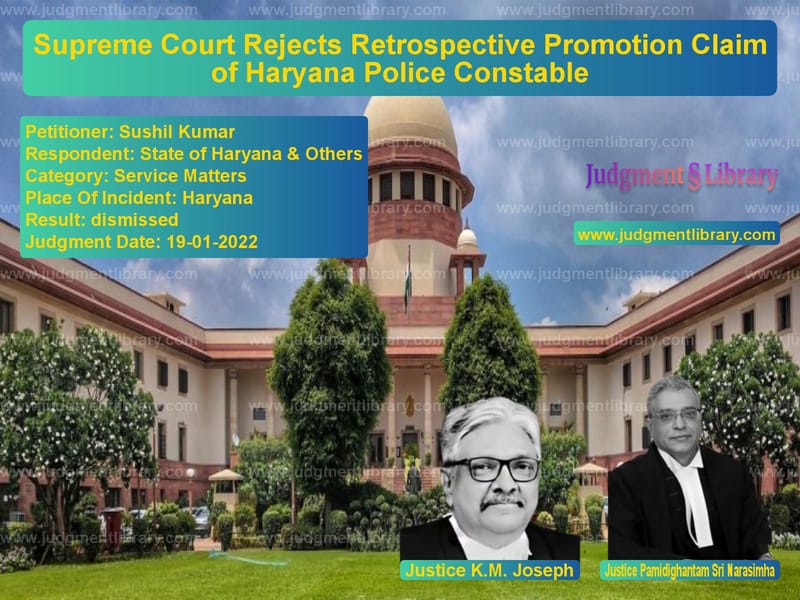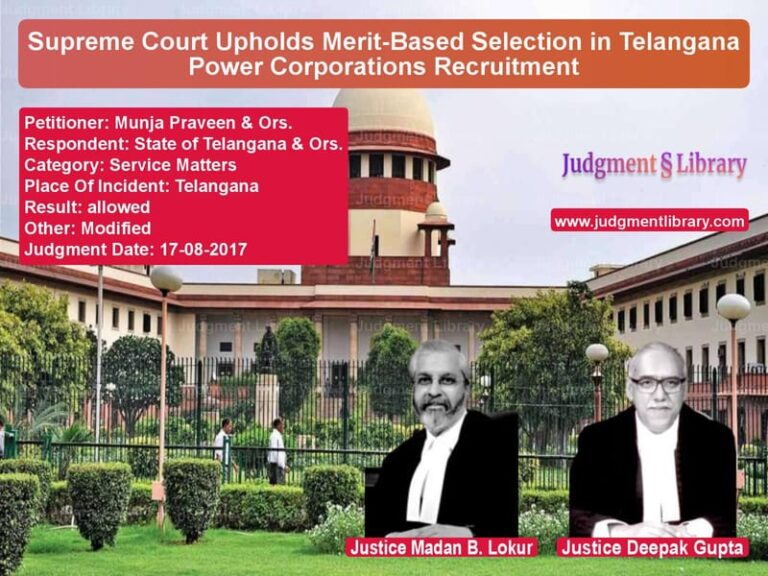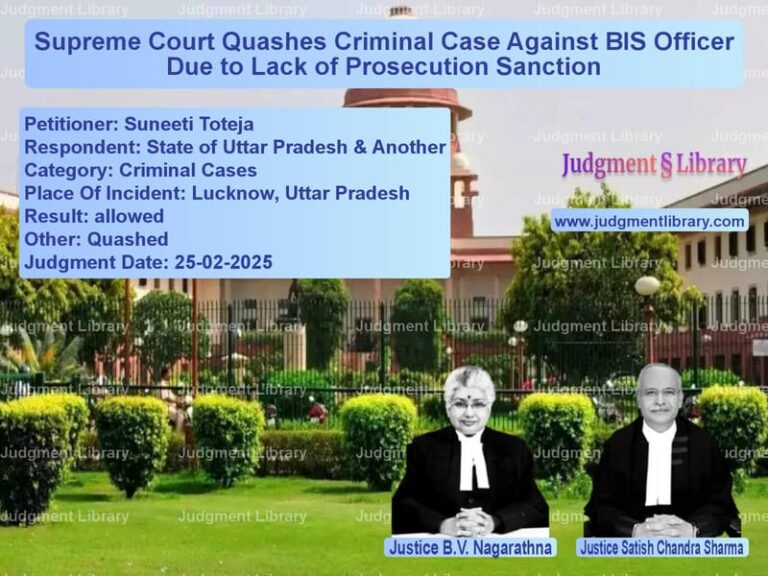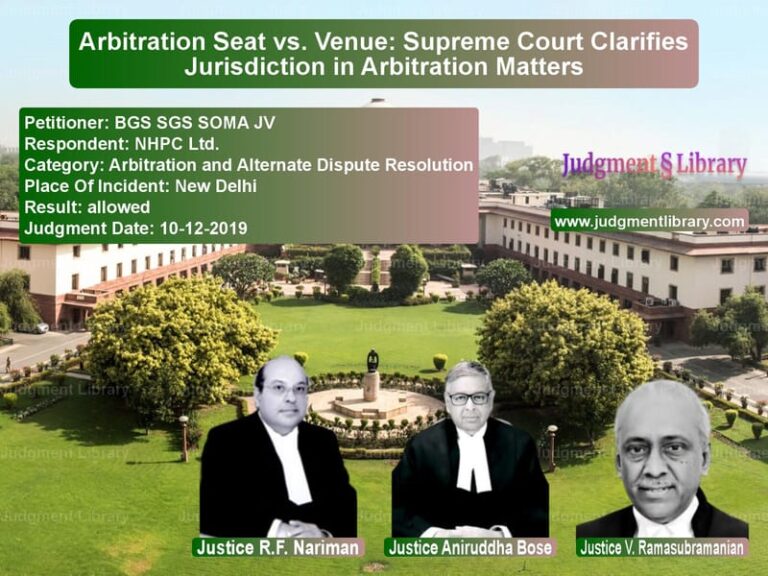Supreme Court Rejects Retrospective Promotion Claim of Haryana Police Constable
The Supreme Court of India recently ruled against a claim for retrospective promotion in the case of Sushil Kumar vs. State of Haryana & Others. The appellant, a Haryana police constable, had sought backdated promotion to the post of Head Constable, arguing that his name was initially recommended but later dropped by the Inspector General of Police (IG). The Court upheld the Punjab and Haryana High Court’s decision, ruling that mere recommendation does not confer a vested right to promotion.
Background of the Case
Sushil Kumar was appointed as a Constable in 1995. His name was initially recommended for promotion under the 10% quota for outstanding performance in 2004 but was later dropped by the IG. He was eventually promoted in 2008 and sought retrospective promotion from 2004. After his plea was dismissed by the Punjab and Haryana High Court, he approached the Supreme Court.
Key Legal Issues
- Does a recommendation by the Superintendent of Police (SP) create an automatic right to promotion?
- Did the IG have the authority to review and alter the recommendations made by the SP?
- Should Sushil Kumar have been granted promotion with retrospective effect from 2004?
Arguments by the Appellant
The appellant, represented by Advocate Surender Kumar Gupta, argued that:
- The IG had no power to interfere with the SP’s recommendation for promotion.
- The IG could not act as an appellate authority and override the decision of the Departmental Promotion Committee (DPC).
- His credentials in 2004 were the same as in 2007, when he was eventually promoted.
- The delay in his promotion was arbitrary and unjustified.
Arguments by the Respondents
The State of Haryana, represented by Additional Advocate General Raj Singh Rana, countered that:
- Recommendations by the SP are provisional and subject to scrutiny by the IG.
- The word “through” in Rule 13.7(9) of the Punjab Police Rules, 1934, implies that the IG has discretionary power to approve or reject recommendations.
- The seven constables who were promoted in 2004 were more qualified than the appellant.
Supreme Court’s Observations
The Supreme Court bench, comprising Justice K.M. Joseph and Justice Pamidighantam Sri Narasimha, ruled against the appellant and made the following key observations:
“The recommendation of the SP is not final and does not create any vested right for promotion. The IG has the power to scrutinize and approve recommendations.”
“The selection process is not a matter of right. The claim that the IG has no authority to review recommendations is legally unsustainable.”
Key Legal Findings
- Authority of IG: The Court reaffirmed that the IG has the power to review and modify the DPC recommendations.
- Promotion Not a Right: The mere recommendation of a candidate does not automatically entitle them to a promotion.
- Comparative Merit: The appellant’s claim that his credentials were the same in 2004 and 2007 was rejected, as each promotion cycle involves different merit-based evaluations.
- Judicial Review Limited: Courts cannot interfere in matters of administrative discretion unless procedural irregularities or malafide actions are proved.
Final Judgment
The Supreme Court dismissed the appeal, stating:
“There is no illegality or arbitrariness in the selection process. The appellant’s claim for retrospective promotion from 2004 is rejected.”
The Court directed both parties to bear their own costs.
Implications of the Judgment
This ruling has significant implications for service matters in law enforcement:
- Hierarchy in Promotion Process: The ruling clarifies that the IG has the final authority in approving promotions.
- Merit-Based Promotions: Candidates cannot claim promotions based on past recommendations alone; comparative merit is crucial.
- Judicial Deference to Administrative Decisions: Courts will not interfere in internal administrative decisions unless procedural unfairness is established.
Conclusion
The Supreme Court’s judgment in Sushil Kumar vs. State of Haryana reinforces the principle that promotions in law enforcement must be based on a thorough selection process, not just prior recommendations. The decision ensures that merit and procedural fairness govern promotions rather than subjective claims of entitlement.
Petitioner Name: Sushil Kumar.Respondent Name: State of Haryana & Others.Judgment By: Justice K.M. Joseph, Justice Pamidighantam Sri Narasimha.Place Of Incident: Haryana.Judgment Date: 19-01-2022.
Don’t miss out on the full details! Download the complete judgment in PDF format below and gain valuable insights instantly!
Download Judgment: sushil-kumar-vs-state-of-haryana-&-o-supreme-court-of-india-judgment-dated-19-01-2022.pdf
Directly Download Judgment: Directly download this Judgment
See all petitions in Promotion Cases
See all petitions in Employment Disputes
See all petitions in Public Sector Employees
See all petitions in Judgment by K.M. Joseph
See all petitions in Judgment by P.S. Narasimha
See all petitions in dismissed
See all petitions in supreme court of India judgments January 2022
See all petitions in 2022 judgments
See all posts in Service Matters Category
See all allowed petitions in Service Matters Category
See all Dismissed petitions in Service Matters Category
See all partially allowed petitions in Service Matters Category







